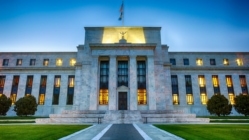The two biggest risks facing the world today involve real estate.
It is ironic because this blog is all about real estate and why I love it so much as an asset class.
But, this blog focuses on U.S. RESIDENTIAL real estate; and the two enormous threats that could (and probably will) trigger economic crises are: (1) commercial real estate; and (2) Chinese residential real estate.
This matters enormously for all of us in the U.S. residential realm because these could likely be the triggers that bring rates plummeting down, as opposed to the Fed just lowering rates because they’re in a good mood and they feel like throwing us all a bone.
Chinese Residential Property Market
I’ve beaten this Chinese property market dead horse into hamburger, but I’m beating it again because I don’t think people understand how serious it is.
It is so serious because of its sheer size, representing the largest asset class in the world – with a value of about $115 trillion, per Statista (in contrast, the U.S. residential property market hit $52 trillion last year, per Zillow).
As I mentioned in previous blogs, there are between 65 to 80 MILLION unsold housing units in China, compared to less than 1 million units here in the U.S. And yes, China’s population is four times larger, but that does not come close to accounting for what could be a 100x delta.
This short CNBC video, How China’s property bubble burst, explains what happened – and it somewhat mirrors what happened in the U.S. prior to 2008. There was a liquidity flood in the Chinese market along with a big push to move people into cities. This was coupled with massive government incentives for both homebuyers and developers, and a fervent belief by homebuyers that the government would never let the market implode.
This is similar to how buyers of mortgage-backed securities prior to 2008 thought they were safe because of AAA (and very misleading) bond ratings and because many were backed by Fannie Mae and Freddie Mac – which were rightfully deemed quasi-government agencies.
In any case, China’s property market turned into a Ponzi scheme (where speculators hoped to sell other speculators coming into the market later) that the government is desperately trying to shore up with stimulus and other incentives. Just like in the U.S. in 2008, I doubt it will work because the sector is just too huge and too upside down with negative equity. And – it will impact the rest of the world because it is so huge – just like the U.S. mortgage crisis impacted the world in 2008.
Commercial Real Estate Crisis
Commercial real estate may be the more pressing concern though, as explained in this short CNBC video: A commercial real estate ‘tsunami’ is coming, says Komal Sri-Kumar
Mr. Sri-Kumar insists that the Fed will have to cut rates drastically by June to avoid an economic meltdown, spurred by the commercial real estate crisis.
Jeff Snider summarizes the problem as well in this short video: Commercial Real Estate Is On The Brink
There is $5.6 trillion of debt secured by commercial real estate right now, but a full $1 trillion of that debt was taken out during the COVID era when rates were at record lows.
The problems include record vacancy levels because of work-from-home trends, ridiculously over-optimistic assumptions when projects were permitted during COVID, a massive oversupply of both office and multifamily buildings, and plunging market values.
Worst of all though is that the debt is all short-term, meaning that it must be refinanced at today’s far higher interest rates – which will make these projects even more untenable (so owners will walk away from their debts and hand the keys to already suffering banks).
NOTE: Many of these projects have been able to avoid refinancing until now, and that is part of the reason the rate increases we saw have not yet impacted the economy as much as many of us expected.
In any case, this massive glut of commercial real estate threatens developers and owners of course, but it threatens the entire banking system much more – and that is why Mr. Sri-Kumar insists that the Fed will have to lower rates.
Mr. Sri-Kumar mentions that it will be a “credit event” (something that severely impacts the banking sector) that forces the Fed’s hand when it comes to massive rate cuts. That is something I hear repeated often by macro analysts too – and the above two real estate sectors could very likely trigger those credit events.
And yes, we may skate through all of this, along with an overheated stock market, a ballooning crypto market, rising unemployment, falling retail sales, increasing foreclosure numbers, and a fast-declining manufacturing sector…but I doubt it.
We may in fact avoid a crisis though; I just don’t think we’re going to avoid a recession. I think the Fed, Congress, the Treasury and $15 trillion of government-infused stimulus (from COVID on) have done a masterful job of postponing it.
























